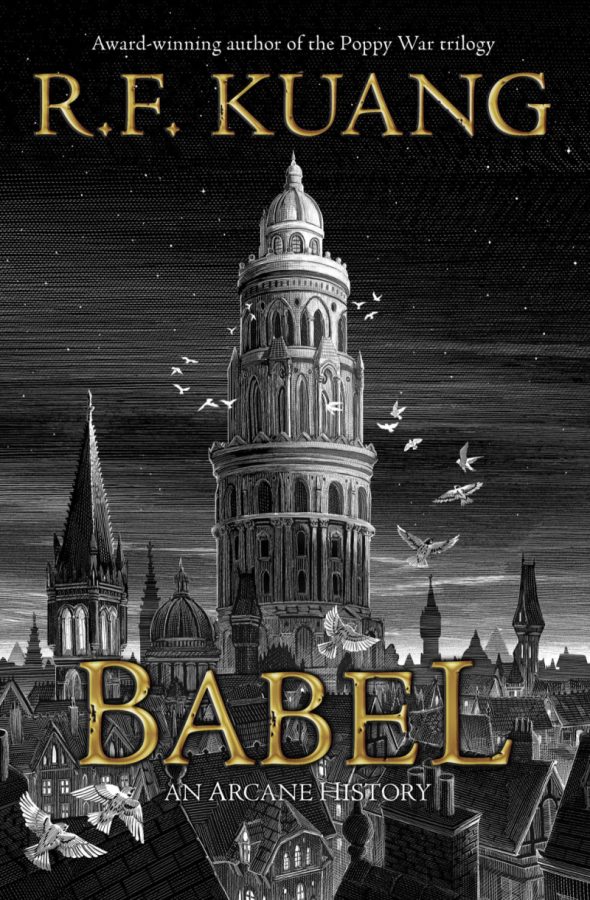“Babel” is a tantalizing tale of academia, secret societies and deadly privilege
(Cover art courtesy of HarperCollins)
“Babel” by R.F. Kuang is in part a critique of the dark academia aesthetic, exploring how affluent nations and institutions thrive on the oppression of others.
November 9, 2022
“Babel” by R.F. Kuang was one of my most anticipated reads of this year. It promised everything I love in a book: magic systems, a poignant narrative, diverse characters, a rich academic setting and some form of societal commentary or critique. “Babel” not only mett these expectations, but it blew right past them with more feeling and dedication than I’d ever hoped it would.
Robin Swift is a young boy on his deathbed in Canton, China, when a mysterious English professor arrives and heals him with magic.The professor offers to give Robin a rich home and education if he agrees to devote his life to studying language at the Royal Institute of Translation, aka Babel, at Oxford College in England.
There, translators at the tower work hard to keep the silver-working magic system alive. When inscribed with two words in different languages, silver bars have a mysterious effect. They can keep water clean, heal the wounded, make trains move on their own or allow people to become completely invisible. England has a near-complete monopoly on this power.
As Robin becomes a young man, he starts to question his upbringing and place at Oxford, which profits from the exploitation of countries like China.
He is torn between the privilege and comfort granted by his life in Oxford and his guilt for aiding an institution that disrespects and oppresses his motherland. Feeling alone apart from his similarly ostracized new friends — Ramy Mirza, Victoire Desgraves and Leticia Price — Robin is roped into a secret society fighting for justice.
View this post on Instagram
This book sucked me completely into its world and then spat me out, shocked and unsure of what to do with myself. I had to try not to cry at work when I finished reading it. I only partially succeeded.
“Babel” is stuffed to the brim with themes and commentary on the issues of colonialism, racism, xenophobia and systems of oppression. It examines how language and multiculturalism can be used as both tools and weapons. The novel proposes that it is impossible to condemn and fight against privilege while wholly and ignorantly reaping its benefits.

The book highlights that more advanced and established countries are happy to degrade and villainize the nations and peoples they profit from, whose cultures and goods they indulge in. “Babel” emphasizes that the very establishments and institutions that favor affluent white communities were built from the sacrifice, labor and knowledge of the oppressed.
This book, most admirably, holds a conversation about the intersectionalities of privilege and oppression, arguing that it is possible to have both at once based on diverse identities. Simply, how some people victimize themselves to invalidate others’ experiences.
One of Robin’s friends, Leticia Price, is a white Englishwoman. While she does face great hardships as a woman in the Victorian Era, she refuses to acknowledge that her friends face discrimination in a different and often worse way. Any time Robin, Ramy or Victoire attempt to point this out, she sees it as an attack on her person.

Leticia fails to see how their walks of life are any different because they are all discriminated against and, in her mind, the distinction between racism and sexism does not matter. These themes are as relevant in real life as they are in “Babel.”
This book is not simply educational, it is also entertaining. Beyond rich explorations of language and discussions of real-world issues are an intriguing plot and loveable characters.
I adored the relationship between Ramy, Robin and Victoire. Letitia, though problematic and unlikeable, helped create an interesting dynamic. Their friendship was dynamic, at times toxic and, at others, filled with love and solidarity. There are no established romantic relationships between any of the main characters in the book, which I appreciate. So many books that would do just fine without a romance throw one in anyway. Some romantic feelings between Robin and Ramy are implied, but they are subtle and unrealized, never a central point of the plot.
There was a fair bit of mystery and tension throughout “Babel” that kept it engaging. Between secret societies, murders and ignored disappearances, this book builds suspense. I certainly found myself sympathizing with the main characters as they tried to navigate the twists and turns.
Robin’s growth throughout the book is heartbreaking and satisfying. He goes from willfully ignorant, to timidly rebellious, to brash, and to a powerful leader of an uprising. While it took a lot of tragedy for him to get there, and his actions were influenced by vengeance and wrath, the development of his character was mesmerizing to watch.
“Babel” ends with a bang. Multiple bangs, actually. I won’t give any spoilers, but the last hundred pages of the book ripped my heart out and stomped on it. I wouldn’t have had it any other way. As painful as it was, it was entirely realistic and necessary to their scenario. A happy ending for all our characters would have made the entire story lose so much impact.

While this was personally a five-star read, it may not be for everyone. Don’t go into this book expecting a fantasy — it is at best historical fiction with a sprinkling of magic thrown in. This book is also pretty heavy on the history and rules of language. It was written captivatingly enough for me to enjoy the lesson, but if you dislike the subject, it may be a chore to read. Content warnings for the book can be found here.
This book was easily one of my favorites of the year, providing both entertainment and meaningful discussion. Any time a book can really speak to my emotions or make me truly consider an important topic, it is a five-star for me — and “Babel” does both.






![“[title of show]” is USI’s first summer musical.](https://usishield.com/wp-content/uploads/2025/07/Title-of-Show-Cover-300x208.png)